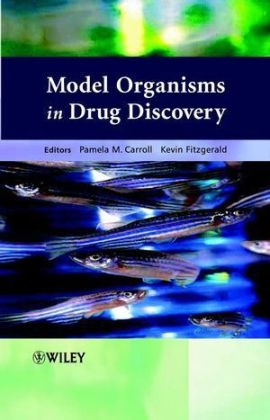
Model Organisms in Drug Discovery
John Wiley & Sons Inc (Verlag)
978-0-470-84893-7 (ISBN)
Fruit flies are "little people with wings" goes the saying in the scientific community, ever since the completion of the Human Genome Project and its revelations about the similarity amongst the genomes of different organisms. It is humbling that most signalling pathways which "define" humans are conserved in Drosophila, the common fruit fly. Feed a fruit fly caffeine and it has trouble falling asleep; feed it antihistamines and it cannot stay awake. A C. elegans worm placed on the antidepressant flouxetine has increased serotonin levels in its tiny brain. Yeast treated with chemotherapeutics stop their cell division. Removal of a single gene from a mouse or zebrafish can cause the animals to develop Alzheimer’s disease or heart disease. These organisms are utilized as surrogates to investigate the function and design of complex human biological systems.
Advances in bioinformatics, proteomics, automation technologies and their application to model organism systems now occur on an industrial scale. The integration of model systems into the drug discovery process, the speed of the tools, and the in vivo validation data that these models can provide, will clearly help definition of disease biology and high-quality target validation. Enhanced target selection will lead to the more efficacious and less toxic therapeutic compounds of the future.
Leading experts in the field provide detailed accounts of model organism research that have impacted on specific therapeutic areas and they examine state-of-the-art applications of model systems, describing real life applications and their possible impact in the future.
This book will be of interest to geneticists, bioinformaticians, pharmacologists, molecular biologists and people working in the pharmaceutical industry, particularly genomics.
Pamela M. Carroll is the editor of Model Organisms in Drug Discovery, published by Wiley. Kevin Fitzgerald is the editor of Model Organisms in Drug Discovery, published by Wiley.
List of contributors. Acknowledgments.
1. Introduction to Model Systems in Drug Discovery (Kevin Fitzgerald and Pamela M. Carroll).
2. Growing Yeast for Fun and Profit: Use of Saccharomyces cerevisiae as a Model System in Drug Discovery (Petra Ross-Macdonald).
3. Caenorhabditis elegans Functional Genomics in Drug Discovery: Expanding Paradigms (Titus Kaletta, Lynn Butler and Thierry Bogaert).
4. Drosophila as a Tool for Drug Discovery (Hao Li and Dan Garza).
5. Drosophila – a Model System for Targets and Lead Identification in Cancer and Metabolic Disorders (Corina Schütt, Barbara Froesch and Ernst Hafen).
6. Mechanism of Action in Model Organisms: Interfacing Chemistry, Genetics and Genomics (Pamela M. Carroll, Kevin Fitzgerald and Rachel Kindt).
7. Gene tics and Genomics in the Zebrafish: from Gene to Function and Back (Stefan Schulte-Merker).
8. Lipid Metabolism and Signaling in Zebrafish (Shiu-Ying Ho, Steven A. Farber and Michael Pack).
9. Chemical Mutagenesis in the Mouse: a Powerful Tool in Drug Target Identification and Validation (Andreas Russ, Neil Dear, Geert Mudde, Gabriele Stumm, Johannes Grosse, Andreas Schröder, Reinhard Sedlmeier, Sigrid Wattler and Michael Nehls).
10. Saturation Screening of the Druggable Mammalian Genome (Hector Beltrandelrio, Francis Kern, Thomas Lanthorn, Tamas Oravecz, James Piggott, David Powell, Ramiro Ramirez-Solis, Arthur T. Sands and Brian Zambrowicz).
Index.
| Erscheint lt. Verlag | 14.10.2003 |
|---|---|
| Verlagsort | New York |
| Sprache | englisch |
| Maße | 170 x 251 mm |
| Gewicht | 680 g |
| Einbandart | gebunden |
| Themenwelt | Medizin / Pharmazie ► Medizinische Fachgebiete ► Pharmakologie / Pharmakotherapie |
| Naturwissenschaften ► Biologie ► Biochemie | |
| Naturwissenschaften ► Biologie ► Mikrobiologie / Immunologie | |
| Technik | |
| ISBN-10 | 0-470-84893-6 / 0470848936 |
| ISBN-13 | 978-0-470-84893-7 / 9780470848937 |
| Zustand | Neuware |
| Haben Sie eine Frage zum Produkt? |
aus dem Bereich


